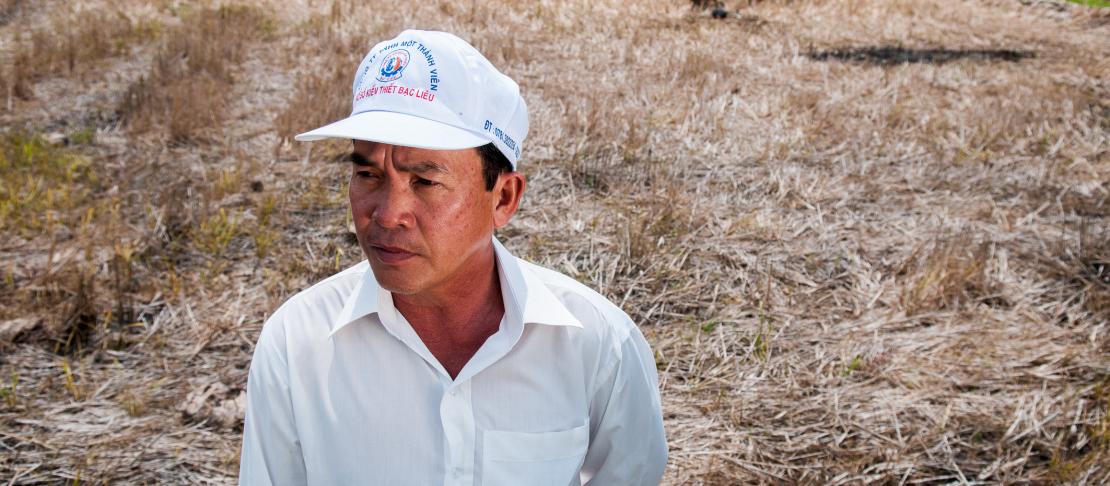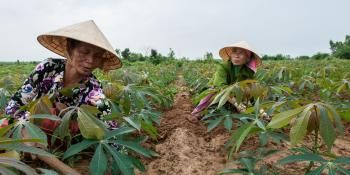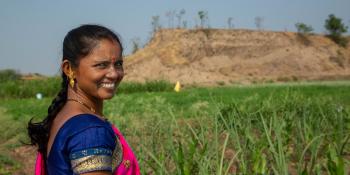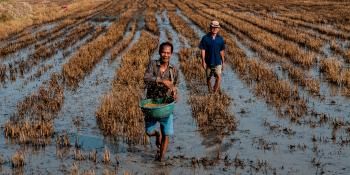Making the UNFCCC work for agriculture in Asia

Experts discussed capacity building opportunities in Asia to present regional perspectives in the UNFCCC.
SBSTA agriculture workshops:
- 2 June 2015: Development of early warning systems and contingency plans in relation to extreme weather events. CCAFS info note | Workshop report
- 3 June 2015: Assessment of risk and vulnerability of agricultural systems to different climate change scenarios (inclusing pests and diseases). CCAFS info note | Workshop report
- 20 May 2016: Identification of adaptation measures in agricultural systems. CCAFS info note
- 23 May 2016: Agricultural practices and technologies to enhance food security, resilience and productivity in a sustainable manner. CCAFS info note
Agriculture in the UNFCCC
Historically, agriculture has been slow to progress under the United Nations Framework Convention on Climate Change (UNFCCC). It was only at the 17th Conference of Parties (COP17) in Durban that the Subsidiary Body for Scientific and Technological Advice (SBSTA) was requested “to consider issues relating to agriculture”. This paved the way for an exchange of views that continues to this day. In the following SBSTA meeting in June 2013, countries decided to solicit inputs from stakeholders on key issues and priorities, and hold a workshop in 2014. This workshop allowed countries to understand priorities in the agricultural sector, and it was decided to hold a series of four workshops and related submission processes, to consider four pressing topics identified.
Building capacity in the agricultural sector in Asia
While agriculture made progress within UNFCCC processes, the participation of Asian countries in the submission process was fairly limited. The Republic of Korea was the only country in Asia to make a submission to SBSTA 42 on issues relating to agriculture. This represented a major gap, considering that of the world’s 500 million smallholder farmers, over 400 million are in Asia. Recognizing this gap, the CGIAR Research Program on Climate Change, Agriculture and Food Security (CCAFS) and the Food and Agriculture Organization of the United Nations (FAO), have partnered to build capacity in the region to present regional perspectives in the UNFCCC.
CCAFS and FAO jointly organized a webinar on 1 March 2016, which brought together experts from both organizations, as well as the UNFCCC and the ASEAN Climate Resilience Network. In the course of the webinar, stakeholders from 17 countries in Asia where capacitated with regard to SBSTA processes and the topics which are to be discussed at SBSTA 44 in May 2016.
Speaking at the webinar, Conrad George, Natural Resources Officer at FAO, pointed out that there are three key considerations on the contents of submissions to SBSTA 44: country situation, framing discussions around priority areas, and consideration of SBSTA in the broader process.
Adaptation measures in agricultural systems of Asia
Identification of adaptation measures is one of the two topics for discussion at SBSTA 44 in May 2016. Speaking on this topic, Sonja Vermeulen, CCAFS Head of Research shared a number of examples from the region. These included measures related to policy frameworks (National Agroforestry Policy of India) to local planning (Climate-Smart Villages in Viet Nam). Speaking on behalf of the ASEAN Climate Resilience Network, Dada Bacudo, Senior Advisor in the ASEAN-German Programme on Response to Climate Change in Agriculture and Forestry, noted that countries in the region urgently need the evidence base for decision making, to scale up good practices, to enhance financing and capacity building, and to extend climate information service for smallholders, and to improve market orientation.
Agricultural practices and technologies to enhance productivity in a sustainable manner, food security and resilience
The second topic for SBSTA 44 relates to agricultural practices and technologies which provide multiple benefits. Pramod Aggarwal, Regional Program Leader for CCAFS South Asia noted that there are a number of tried and tested practices and technologies which can be scaled up in Asia. He explained how interventions such as Laser-Assisted Precision Land Levelling, Alternate Wetting and Drying in irrigated rice production, weather-based insurance, Climate-Smart Villages, and stress-tolerant rice varieties, are making differences to the lives of millions of farmers in Asia. Frameworks which allow decision makers to combine and apply different practices and technologies are also crucial. Martial Bernoux, Senior Natural Resources Officer, FAO, explained how various frameworks and approaches developed by FAO can help countries address climate impacts. These frameworks include: climate-smart agriculture (CSA), Save and Grow, and Sustainable Intensification of Smallholder Crop Production. In applying such frameworks, Dada Bacudo noted the importance of indigenous practices, field-tested crop management measures, and knowledge-based options, which form the foundations of regional priorities in Southeast Asia.
Way forward
Beau Damen, Natural Resources Officer - Climate Change and Bioenergy at FAO’s regional office for Asia and the Pacific explained that stronger engagement with the SBSTA is an important opportunity for countries in Asia to draw attention to country-specific and regional issues for climate change in the agricultural sectors, and climate change and food security more broadly. He noted that organizations such as FAO and CCAFS have an important role to play in supporting countries to ensure that their perspectives are better reflected in international climate frameworks.
In this regard participants identified a number of ways that FAO and CCAFS could continue to support countries engage with SBSTA and other UNFCCC processes including establishing a regional network for information exchange and follow-up opportunities for exchange of perspectives between country representatives and technical experts.
Presentations and recordings from the webinar:
Background to SBSTA and the UNFCCC, Wojtek Galinski, UNFCCC:
Adaptation measures in agricultural systems: messages to SBSTA 44, Sonja Vermeulen, CCAFS:
ASEAN SBSTA 44 Submission on Adaptation Measures, Dada Bacudo, ASEAN CRN:
Agricultural practices and technologies to enhance resilience, food security and productivity, Pramod Aggarwal, CCAFS:
FAO’s Submission D to SBSTA 44 (May 2016), Martial Bernoux, FAO:
ASEAN SBSTA 44 Submission on Agriculture Practices and Technologies, Dada Bacudo, ASEAN CRN:
Further readings:
Adaptation measures
- FAO 2016. Submission by FAO to UNFCCC on issues relating to agriculture: adaptation measures.
- Vermeulen SJ, Dinesh D. 2016. Measures for climate change adaptation in agriculture. Messages to the SBSTA 44 agriculture workshops. CCAFS Info Note. Copenhagen, Denmark: CGIAR Research Program on Climate Change, Agriculture and Food Security (CCAFS).
- Dinesh D, (Ed). 2016. Adaptation Measures in Agricultural Systems: Messages to SBSTA 44 agriculture workshops. CCAFS Working Paper no. 145. Copenhagen, Denmark: CGIAR Research Program on Climate Change, Agriculture and Food Security (CCAFS).
Agricultural practices and technologies
- Dinesh D, Vermeulen SJ. 2016. Climate change adaptation in agriculture: practices and technologies. Messages to the SBSTA 44 agriculture workshops. CCAFS Info Note. Copenhagen, Denmark: CGIAR Research Program on Climate Change, Agriculture and Food Security (CCAFS).
- FAO 2016. Submission by FAO to UNFCCC on issues relating to agriculture: agricultural practices and technologies.
- Dinesh D, (Ed). 2016. Agricultural practices and technologies to enhance food security, resilience and productivity in a sustainable manner: Messages for SBSTA 44 agriculture workshops. CCAFS Working Paper no. 146. Copenhagen, Denmark: CGIAR Research Program on Climate Change, Agriculture and Food Security (CCAFS).
Authors: Dhanush Dinesh, Global Policy Engagement Manager, CCAFS; Beau Damen, Natural Resources Officer - Climate Change and Bioenergy, FAO; Maria Nuutinen, Climate Change Officer, FAO; Soojin Kim, Junior Professional Officer (Climate Change), FAO; Alashiya Gordes, Junior Professional Officer (Climate Change), FAO.



